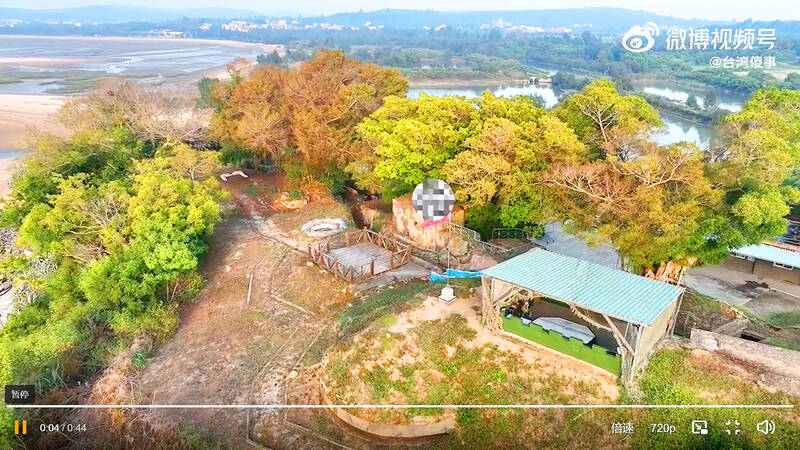The Kinmen Defense Command yesterday said it would drive Chinese drones out of Kinmen County, and shoot them down if warnings are ignored.
The command made the announcement after video footage taken from a drone that circled above troops stationed in the county’s Lieyu Township (烈嶼) circulated on Chinese microblogging site Sina Weibo (微博) on Saturday.
Troops had noticed the drone over the township on Saturday, and had determined it to be a civilian drone, the command said in a news release.

Photo: Still image taken from a video on Sina Weibo
In accordance with standard procedure, the troops fired a warning flare at the drone and went on high alert, it said.
The military aims to avoid escalating such situations, but would take countermeasures to prevent incursions into the country’s airspace by drones and other airborne objects, the command said, adding that China has been making such incursions with increasing regularity over the past few weeks.
“These repeated provocations are a threat to Taiwan’s national defense and aviation safety, and we will take necessary measures to stop them,” the command said.
On Aug. 16, a separate video circulated on Sina Weibo showing Taiwanese troops throwing stones at a Chinese drone that entered airspace above Erdan Islet (二膽).
The incident was criticized by the Ministry of National Defense as a Chinese attempt at cognitive warfare and sparked public debate about how the military should respond to “gray-zone” tactics — defined as coercive actions carried out by seemingly non-state or nonmilitary actors.
The ministry on Wednesday last week said it had already drafted plans for a drone defense system, which it expects to deploy next year.
GEOSAT Aerospace & Technology Inc (經緯航太科技) chief executive officer Lo Cheng-fang (羅正方) yesterday said that the army should not hesitate to use counter-drone weapons if any are spotted in Taiwan’s territorial airspace.
When faced by China’s provocative gray-zone tactics, the worst thing Taiwan can do is nothing, because it would simply encourage Beijing to be more aggressive, he said.
Lu Li-shih (呂禮詩), a former navy lieutenant commander, said that the army should try to set up a virtual perimeter known as a geofence around a no-fly zone between the offshore counties and China to stop drones from entering.
Democratic Progressive Party Legislator Wang Ting-yu (王定宇) said that the ministry could work with domestic drone manufacturers to devise drone-defense solutions.
Speaking about an incident yesterday in which two Chinese fishers washed up alive in the county, Wang said that authorities should provide all necessary assistance in such cases, but exercise caution and thoroughly investigate whether other motives are at play.

SECURITY: As China is ‘reshaping’ Hong Kong’s population, Taiwan must raise the eligibility threshold for applications from Hong Kongers, Chiu Chui-cheng said When Hong Kong and Macau citizens apply for residency in Taiwan, it would be under a new category that includes a “national security observation period,” Mainland Affairs Council (MAC) Minister Chiu Chui-cheng (邱垂正) said yesterday. President William Lai (賴清德) on March 13 announced 17 strategies to counter China’s aggression toward Taiwan, including incorporating national security considerations into the review process for residency applications from Hong Kong and Macau citizens. The situation in Hong Kong is constantly changing, Chiu said to media yesterday on the sidelines of the Taipei Technology Run hosted by the Taipei Neihu Technology Park Development Association. With

CARROT AND STICK: While unrelenting in its military threats, China attracted nearly 40,000 Taiwanese to over 400 business events last year Nearly 40,000 Taiwanese last year joined industry events in China, such as conferences and trade fairs, supported by the Chinese government, a study showed yesterday, as Beijing ramps up a charm offensive toward Taipei alongside military pressure. China has long taken a carrot-and-stick approach to Taiwan, threatening it with the prospect of military action while reaching out to those it believes are amenable to Beijing’s point of view. Taiwanese security officials are wary of what they see as Beijing’s influence campaigns to sway public opinion after Taipei and Beijing gradually resumed travel links halted by the COVID-19 pandemic, but the scale of

A US Marine Corps regiment equipped with Naval Strike Missiles (NSM) is set to participate in the upcoming Balikatan 25 exercise in the Luzon Strait, marking the system’s first-ever deployment in the Philippines. US and Philippine officials have separately confirmed that the Navy Marine Expeditionary Ship Interdiction System (NMESIS) — the mobile launch platform for the Naval Strike Missile — would take part in the joint exercise. The missiles are being deployed to “a strategic first island chain chokepoint” in the waters between Taiwan proper and the Philippines, US-based Naval News reported. “The Luzon Strait and Bashi Channel represent a critical access

Pope Francis is be laid to rest on Saturday after lying in state for three days in St Peter’s Basilica, where the faithful are expected to flock to pay their respects to history’s first Latin American pontiff. The cardinals met yesterday in the Vatican’s synod hall to chart the next steps before a conclave begins to choose Francis’ successor, as condolences poured in from around the world. According to current norms, the conclave must begin between May 5 and 10. The cardinals set the funeral for Saturday at 10am in St Peter’s Square, to be celebrated by the dean of the College